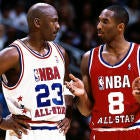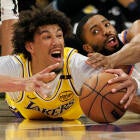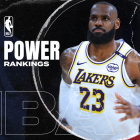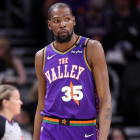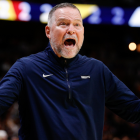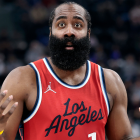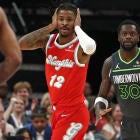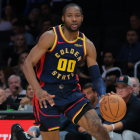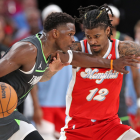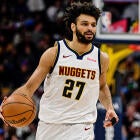Moments before the 1998 All-Star Game tipped off, then-NBC announcer Bob Costas introduced Kobe Bryant as "the man many have dubbed 'the next Michael Jordan.'" Bryant was 19 years old, starting for the Western Conference even though he was still coming off the bench for the Los Angeles Lakers. Jordan was representing the Chicago Bulls in the event for the last time.
The fifth episode of "The Last Dance," the 10-part ESPN/Netflix documentary, begins with a dedication: "IN LOVING MEMORY OF KOBE BRYANT." It features highlights of Jordan and Bryant going at each other at Madison Square Garden and behind-the-scenes footage of Jordan and his Eastern Conference teammates talking about Bryant.
Before his death, Bryant was interviewed for the documentary. In the middle of the All-Star sequence, he looks back on that time and speaks reverentially about Jordan.
"It was a rough couple of years for me coming into the league," Bryant says. "'Cause at the time the league was so much older. It's not as young as is is today. So nobody was really thinking much of me. I was the kid that shot a bunch of airballs, you know what I mean? And at that point Michael provided a lot of guidance for me. Like, I had a question about shooting his turnaround shot, so I asked him about it. And he gave me a great, detailed answer. But on top of that he said, 'If you never need anything, give me a call.'
"He's like my big brother. I truly hate having discussions about who would win one-on-one, or fans saying, 'Hey, Kob', you'd beat Michael one-on-one.' I feel like, yo, what you get from me is from him. I don't get five championships here without him because he guided me so much and gave me so much great advice."
There was some tension back then, however. In the locker room at MSG, Jordan says, "That little Laker boy's going to take everybody one-on-one."
"I know, right?" Tim Hardaway replies.
"He don't let the game come to him," Jordan says. "He just go out there and take it. 'I'm going to make this s--- happen. I'm going to make this a one-on-one game.'"
Off-camera, another All-Star says he figured Bryant would chill after his first four attempts.
"After his first four attempts?" Jordan says. "If I was his teammates I wouldn't pass him the f---in' ball. You want this ball again, brother, you better rebound."
Here's what "The Last Dance" doesn't tell you about that night and the relationship between Jordan and Bryant.
Jordan was sick in New York
There is a brief exchange between Jordan and Eastern Conference coach Larry Bird at the team photoshoot, in which Bird says, 'So, you're feeling all right, huh?" The documentary does not explain, however, that Jordan had the flu leading up to the All-Star Game. He missed practice and was listed as questionable before the game.
Bird told Newsday's Mike Gavin in 2015 that Jordan was clearly still sick on the bus to the arena, but Bryant got him going: "Kobe was trying to go after Michael early. And Michael started going back at him."
During the game, Ahmad Rashad interviewed Jordan on the bench. "He's being very, very aggressive," Jordan said on the broadcast. "If I knew someone was sick, certainly the first thing I'd do, I'd go after someone. But I've gotta defend myself. You know, he's gotta play defense just like I gotta play defense." He also said that he hadn't been near a basketball for three or four days.
Jordan finished with a game-high 23 points on 10 for 18 shooting, plus eight assists, six rebounds, three steals and his third All-Star Game MVP award. Bryant had 18 points, the most of any West player, on 7 for 16 shooting, plus one assist, three rebounds and two steals.
"I really didn't expect to come in here and win the MVP award," Jordan said that night. "I just wanted to make sure Kobe didn't dominate me.
"It was a good battle. It was fun. He attacked. The hype was me vs. him. I knew I wasn't 100 percent and he was, and he was biting at the bit. I'm just glad that I was able to fight him off."
Not everybody loved Bryant's approach
The Michael vs. Kobe storyline started before the game did, even though one of them was near his 35th birthday and the other only 19 years old. In the press, Bryant downplayed it, per "Showboat: The Life of Kobe Bryant," by Roland Lazenby:
The dominant question, repeated often, was a request for Bryant to compare himself with Jordan. "There aren't any similarities," the teenager replied, "other than we're both six-six and we rely on athletic ability. I mean, he's Michael Jordan."
...
"I wanted eventually to be one of the best players in the league," Bryant would say, looking back two years later. "I just didn't know that other people would urge me to be that right away. Everybody was expecting me to be the next Michael. I thought I was going to sneak through the back door."
Bryant did not act so humble on the court. He famously waved off a screen from Karl Malone, angering the veteran, and Western Conference coach George Karl kept Bryant on the bench for the entire fourth quarter.
"It's a team game," Karl told reporters, via Lazenby. "Kobe made some great plays, but Michael and the East made better basketball decisions. Kobe will probably have the opportunity to come back here and add more 'simple' to what he's doing."
Bryant used the benching as motivation when facing Karl's Denver Nuggets in the 2008, 2009 and 2012 playoffs, he told Darius Miles and Quentin Richardson on the Knuckleheads podcast last September.
Jordan and Bryant's relationship was complicated
As "The Last Dance" illustrates, Bryant was unafraid to be competitive with Jordan right away, but there was always mutual respect. Bryant modeled his game after Jordan's and leaned on him as a mentor. Jordan talked about this during his teary, unforgettable speech at Bryant's memorial:
"He wanted to be the best basketball player that he could be," Jordan said that day at Staples Center. "And as I got to know him, I wanted to be the best big brother that I could be. To do that, you have to put up with the aggravation, the late-night calls or the dumb questions. I took great pride, as I got to know Kobe Bryant, that he was just trying to be a better person, a better basketball player. We talked about business, we talked about family, we talked about everything."
In the documentary, when Bryant mentions asking Jordan about his turnaround jumper and Jordan saying he can call anytime, he is referring to a game in December of his second season, a couple of months before that All-Star Game at MSG. Bryant scored 33 points off the bench and Jordan had 36 in the Bulls' 104-83 victory. Scottie Pippen and Shaquille O'Neal were both out with injuries, adding to the Michael-against-Kobe vibe.
"In the fourth quarter of that game, he asked me about my post-up move, in terms of, 'Do you keep your legs wide? Or do you keep your legs tight?' It was kind of shocking," Jordan said, via Lazenby. "I felt like an old guy when he asked me that. I told him on the offensive end you always try to feel and see where the defensive player is. In the post-up on my turnaround jump shot, I always use my legs to feel where the defense is playing so I can react to the defense."
He might have been dispensing advice, but, just like at the All-Star Game, Jordan wanted the world to know he was the best player on the planet.
"Michael loves this stuff," Bulls guard Ron Harper said, via Lazenby. "[Kobe] is a very young player who someday may take his throne, but I don't think Michael's ready to give up his throne yet. He came out to show everybody that he's Air Jordan still."
Bryant told ESPN's Jackie MacMullan in 2016 that he peppered Jordan with questions about post defense when the next season was delayed by a lockout: "Speaking to M.J. was like getting my own college education at the highest level."
The endless comparisons, however, made the relationship more complex than it seems in "The Last Dance." Yes, Bryant copied "damn near 100 percent" of Jordan's technique, Bryant told Bleacher Report's Howard Beck in 2017, but in a 2014 story from the same outlet, Kevin Ding wrote that there was a time when asking him about Jordan might elicit an eye roll.
"The thing that I always bristled at was the notion that I learned everything that I know from Michael," Bryant told Ding. "That's just not true. Hakeem Olajuwon deserves a lot of credit; Jerry West deserves a lot of credit. Oscar Robertson deserves a lot of credit. I really was a student of the game and watched everybody."
In 2010, Bryant told Adrian Wojnarowski that he got his mentality from Michael Jackson, not Jordan. In an ESPN column after Bryant's death, Wojnarowski wrote that Bryant had felt slighted because Jordan had left him off "some sort of list of great players."
The first time Bryant noticed Jordan, he hadn't turned six yet. Jordan was playing for the United States' national team in 1984, preparing for the Olympics with a series of games against pros.
"This guy dribbles on the fast break and took off -- I think it was over Magic -- and dunked and flew past Magic," Bryant said, via Lazenby. "That's not supposed to happen. Who was this kid? I don't like this kid 'cause Magic was my guy. I think that's the first time I saw him."
As strange as it sounds given how Bryant's game developed, Lazenby wrote that "the unquestioned star of the Bryant household during Kobe's young life was Magic Johnson."
In the same biography, however, legendary shoe executive Sonny Vaccaro recalls recruiting Bryant for Adidas and noticing that Bryant was adopting Jordan's mannerisms. Bryant shaved his head and even sounded more like Jordan when he talked. Adidas' message was that he would be the next Jordan, and it had apparently sunk in.
Vaccaro also recalled Bryant saying, "I'm going to be better than he is."
Bryant was studying and mimicking Jordan, but Peter Moore, then Adidas' creative director, said he made it known that "wanted to be his own icon," even before he played an NBA game.
In a January 2000 game against the Nuggets, Bryant hit his first eight shots and scored 27 points in the first half with Jordan watching from a suite. Bryant told reporters that he knew Jordan was in attendance, but when asked if he raised his game because of it, smiled and said, "Nope." Phil Jackson arranged a meeting between the two of them, and later said in an interview on Fox Sports Live that the first thing Bryant said was, "I could kick your ass one-on-one."
In his interview with Ding, Bryant categorized that as "mythology" and said that whenever he and Jordan talked trash, Jordan initiated it. But this could very well be the same meeting Jordan described at Bryant's memorial, in which he walked into the room and Bryant immediately asked if he'd brought his basketball shoes with him.
In Michael Leahy's book "When Nothing Else Matters," Jordan is described as vacillating "between the roles of mentor and rival for Bryant." Jordan counseled him about the triangle offense on Jackson's behalf, but could get irritated with reporters who asked him about Bryant, particularly if he perceived that they were implying the two were on the same level in their respective primes.
The Washington weirdness
As a Washington Wizards executive, Jordan was frustrated by the way the league's new stars were being discussed. In an interview with Leahy that foreshadowed his comeback, he directly mentioned Bryant:
He betrayed the anxiety of a deity who worried about his legend slowly receding. "I don't want to sound bitter or old or whatever," he muttered. "I'm just saying that when Michael Jordan is not playing --" He abruptly stopped himself, only then seeing where he wanted to go with this, thinking of the buzz surrounding the Los Angeles Lakers superstar Kobe Bryant. "If a guy -- for instance, the other night, Kobe Bryant scores 51 points. Now that is a huge story. And then comparisons start to be made to Michael Jordan. But people tend to forget that Michael Jordan scored 50-plus points three games in a row. You understand my whole point? ... People tend to migrate to the [current] player because two years have elapsed from seeing Michael Jordan on the basketball court."
And then there was this story, leaked by Jordan's camp:
Jordan had much the same kind of relationship with Kobe Bryant that he had with many young stars, giving advice when asked. For a long while, Bryant had ravenously absorbed every suggestion. But given each man's nature, it was inevitable, as Bryant matured and needed Jordan's pointers less, that something said by one would sometimes push the competitive buttons of the other. Bryant had listened coolly once, during Jordan's executive days, when the mentor lectured him on defensive techniques. It was a day when Jordan bantered lightly about the fantasy of playing again. Chuckling, Bryant responded, "Stay upstairs, old man. You'll have more fun upstairs."
Jordan and Bryant's final matchup was In March 2003, near the end of Jordan's actual last dance. Bryant scored 55 points against Jordan's Wizards, including 42 in the first half:
17 years ago today: Kobe drops 55 in his final battle with Michael Jordan 🐐🐐 #BestOfLakersWizards pic.twitter.com/ld61G2EM79
— Los Angeles Lakers (@Lakers) March 28, 2020
According to Gilbert Arenas, Bryant was trying to prove a point. On the No Chill podcast, Arenas said that, following Washington's win against Los Angeles earlier in the season, Jordan told Bryant that he could put Jordan's shoes on, but would never fill them.
There was a time, however, when Bryant wanted to play for the Wizards because of Jordan's presence. They were never going to be teammates, but in 2015 Michael Lee, then of the Washington Post, reported that Bryant had told Jordan multiple times that he wanted to join the team after Jordan retired for good. (This was back when Bryant was feuding with Shaquille O'Neal and everybody assumed Jordan would return to his former role in D.C.)
"I've always been very big on having mentors, on having muses and I've been really, really big on that," Bryant told Lee. "Being around guys who have done it before and done it at a high level and always tried to pick their brains and always tried to absorb knowledge. Obviously, being in that situation [with the Wizards], it would've helped having to be around him every day and so on."
Bryant said he was certain they would have won titles together. And according to a source close to Jordan, had he been running the team in 2004, Jordan was confident that Bryant would have signed with Washington as a free agent.
![[object Object] Logo](https://sportshub.cbsistatic.com/i/2020/04/22/e9ceb731-8b3f-4c60-98fe-090ab66a2997/screen-shot-2020-04-22-at-11-04-56-am.png)








